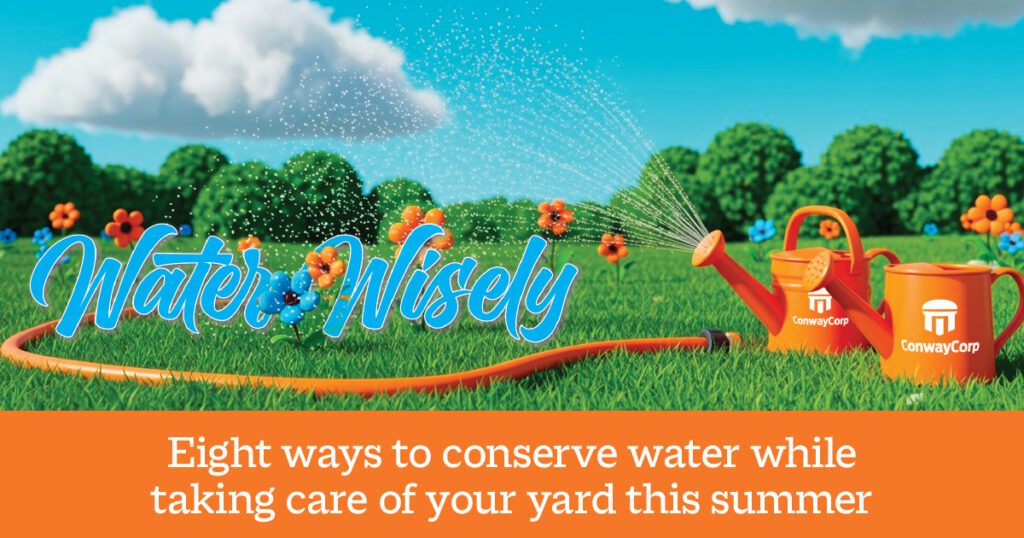30 Mar 2025 Eight ways to conserve water while taking care of your yard this summer
By Beth Jimmerson
The days are getting longer and the weather is warming, which means gardening season is about to be in full swing. From vegetable gardens to flowers to just watering your lawn, you might start noticing an increase in your water bill soon.
While it’s best to plant native, drought-resistant plants for yards and gardens to help save water, you don’t need to rip out your landscaping in order to reduce your water bill this summer. Instead, try employing some of these smart watering techniques.

Use a smart hose timer
One way to reduce watering costs is to set a timer so your hose can turn on at the optimal time of day for a planned amount of time. Using a smart hose timer allows you to time your sprinkler or other watering system. Many timers also have the option to delay the watering schedule in the event of rain to prevent double watering. You can use a smart hose timer that connects to an app to keep track of your watering history and adjust to conserve water.
Water at the right time of day
Watering your garden or lawn in the middle of the day can cause more of the water you use to evaporate before it gets to your plants. Watering before the sun comes up or after it sets can save you water by making sure more of the water from your hose makes it to your plants.
Consider drip irrigation
Since a sprinkler throws water droplets up into the air before they hit your plants, they tend to use more water than a drip irrigation system or a soaker hose that rests on the ground and emits water directly onto the soil. A drip system also allows you to more precisely plan where you want to water, so if you have plants that need a lot of moisture, you can add a drip hose or soaker hose to those areas in particular.
Mulch your garden beds
To keep more moisture close to the soil and slow down the evaporation process, allowing more of your water to make it to the roots of your plants, add some mulch to the surface of your garden beds. To mulch, you can use grass clippings or leaves, which have the benefit of being free, or you can opt for wood mulch instead.
Direct your rainwater
Rain is the cheapest of all irrigation methods. If you have downspouts that route water away from your foundation when it rains, you can add a downspout extension to aim your rainwater runoff toward your garden beds or particular plants that need more moisture. You can also choose to add a rain barrel with a downspout diverter to collect rainwater.
Perform preventative maintenance
Check your hose connections that you use for watering as well as any buried lines for leaks on a regular basis. A single 1/32-inch diameter leak on a hose or outdoor faucet can waste up to 6,000 gallons of water a year. To check for leaks, look for excessively damp areas, especially when your sprinklers and valves are off. You can look for puddles or muddy areas that aren’t reduced by dry conditions in other places as well as spongy spots on your lawn. Put leak inspection on your weekly list, and replace any hoses, valves or faucets with leaky connections.
Mow high
Keep your grass at the upper recommended limit – about 2 inches for most types. Not only does it mean mowing less often, but it will also help shade the soil and prevent excessive evaporation.
Don’t overwater
It sounds simplistic, but more water is wasted through overwatering than for any other reason. Watering too much doesn’t just waste a precious resource, it is also very bad for your plants. Too much water in the soil stresses your plants’ root systems and contributes to root rot and fungal and bacterial disease. Consult a landscape professional for help in designing a watering system and/or schedule to deliver the correct amount of water for your particular landscape.
We all see our water use rise during the summer, but our monthly statements don’t have to rise too. Start planning now to use water more efficiently, and your lawn and gardens will stay green without costing too much green.
Looking for more ways to save this summer? Visit ConwayCorp.com/EnergySmart or call 501.450.6000 to schedule a free energy audit with a Conway Corp certified energy professional to help find ways to decrease electric and water use in your home.
We’re dedicated to providing an excellent water product at the lowest possible cost to our customers. From the lake to the water quality lab to your faucet, we’re at work every day delivering a safe, reliable water supply for the residents of Conway. You can drink, wash and cook comfortably knowing we have a 30-year plan to prepare for Conway’s future water needs so our community has ample water for years to come.
- The 2026 Energy Smart Challenge - December 31, 2025
- This winter, keep the warm in and the chill out - December 2, 2025
- Let’s talk turkey - November 4, 2025









